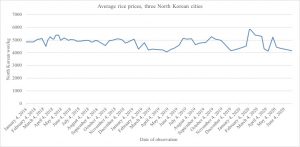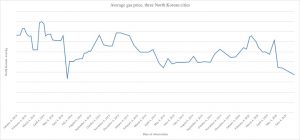What explains North Korea’s puzzling price stability?
By Benjamin Katzeff Silberstein
Looking at the latest market price data from North Korea, things do not look like external conditions dictate that they should. Food prices are…low. Very low. In fact, for the July 1st price report, the average rice price for the three North Korean cities was the lowest on record since April 2019. Gasoline prices haven’t been this low since June of 2018. (Click for larger graphs.)


By themselves, these prices are not so surprising. Prices generally fluctuate with seasonal variation, in North Korea as everywhere else. Both gas and rice prices tend to drop around this time of year, at least over the past few years.
But there is nothing normal about 2020. In addition to harsh sanctions, Covid-19 has made almost everything more difficult to acquire from abroad, from fertilizer and food, to machine parts for industry. So these lower prices are puzzling, in a way because they would seem to indicate stability and normalcy at a time when there is nothing stabile and normal about the situation.
There are (at least) two possible explanations:
One is that North Korea’s external conditions are indeed steadily improving, and returning to some sort of normalcy. Strong signs suggest that trade between North Korea and China is picking back up, as relations deteriorate between the US and China and the North Korean issue becomes less and less central on the global stage. As Daily NK has reported, North Korea has been importing items such as construction materials and food from China, both in June and July. Gas prices, moreover, may partially be untouched by Covid-19 because much of the trade goes through a pipeline near Dandong.
Another possibility is that prices are going down because people simply cannot afford higher prices. This report on train ticket prices is perhaps instructive. In the words of one source inside North Korea: “Despite the fall in the number of train passengers, [black market vendors] seem to believe that raising prices would [make it harder to sell tickets],” the source said. “In other words, you could say that a ‘market price’ [for tickets] has appeared that train riders are willing to accept.” In other words, if consumers on a given market have a reservation prices – the highest price they’re willing to pay – underneath what sellers would really charge given the supply at hand, sellers can either cut down on their profit or minimize their losses by selling at a lower prices than those dictated by economic conditions.
As always, information is in short supply, and these market prices raise more questions than they answer.
Update, 23/7/2020:
Part of what’s so puzzling about all this is that reports keep suggesting that the regime is cracking down continuously and with growing vigor against cross-border smuggling and the like. According to this report by Daily NK, Pyongyang recently ordered provincial authorities to intensify their border monitoring.
View Original Article